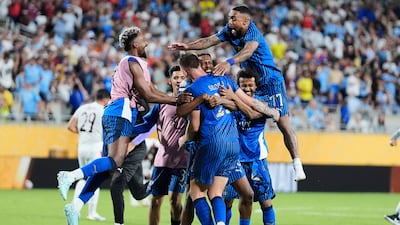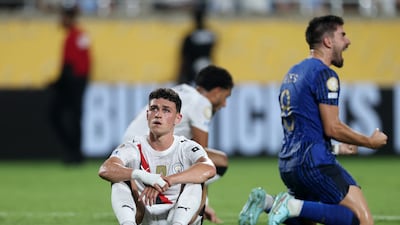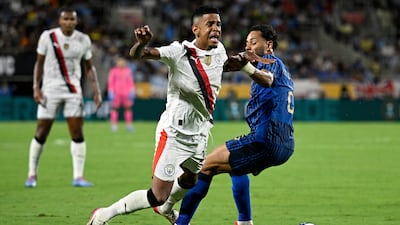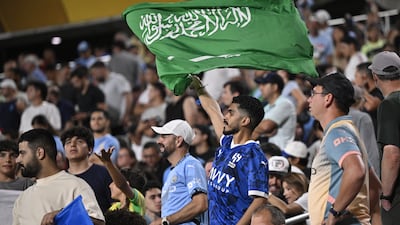Q: Did you watch Al Hilal crush Manchester City! How did they manage it?
@Faisalehh via Instagram
A: It was an incredible match, perhaps the game of the tournament so far! A seven-goal thriller that no one saw coming. But Al Hilal didn’t crush them.
Manchester City were the only team to win all three of their group-stage matches – and they didn’t top their group by accident. Their goal was clear: avoid Real Madrid. A smoother path to the quarter-finals was targeted, with Al Hilal seen as the ‘easier’ opponent.
Instead, it was Al Hilal who stole the spotlight – and knocked City out.
Credit goes to Simone Inzaghi. His team produced a disciplined, incisive counter-attacking performance – exactly the kind he’s built his reputation on. Set up in a 5-4-1 formation, Al Hilal targeted City’s weakness in transition and capitalised on their players’ strengths, especially Malcom.
Hilal's standout forward drove forward with intent and exploited space with pace and precision. City simply couldn’t cope with his speed. Without Aleksandar Mitrovic, there were questions about where the goals would come from, but Inzaghi’s system provided the answer.
The real hero, though, was Bono. The Moroccan goalkeeper – a star of the 2022 World Cup – was exceptional. He made 10 saves to Ederson’s two, keeping City at bay despite their 30 shots (14 on target). Without him, the scoreline could’ve been ugly.
What stood out most was Al Hilal’s mentality. Inzaghi has already instilled a clear sense of belief and structure. The team worked tirelessly, tackled, and won the key duels. Ironically, it was City’s opening goal that ignited their ferocity – it seemed to provoke the Saudi side into action. From that moment on, they played with intensity and conviction, delivering one of the Fifa Club World Cup’s most dramatic upsets.
Q: Ruben Neves is one of the best midfielders in the world. Are Al Hilal building around him or do you think he’ll come back to Wolves?
@Zaido via Instagram
A: I don’t see Ruben Neves returning to Wolves anytime soon. But the admiration for him remains deep, as shown by the wave of affection that followed his decisive penalty for Portugal in the Uefa Nations League final. He left a lasting mark at Molineux; few overseas players have connected so completely with a fan base.
For now, though, Neves is flourishing at Al Hilal. He played a central role in their victory over Manchester City, helping guide the team into the Club World Cup quarter-finals. It’s been a standout month for him, both individually and collectively.
Throughout the group stage, he dictated the pace of play, anchoring midfield with assurance. In matches against Real Madrid and RB Salzburg, he led all players in completed passes – a clear reflection of his composure and intelligence.
Inzaghi’s system demands versatility. His teams shift fluidly between attacking through central channels and stretching play out wide, depending on where the spaces are. Neves fits in perfectly. He’s technically gifted, positionally astute, and equally capable of stepping into a defensive role, as he did against City, when the tactical balance requires it.
What sets him apart, though, is his ability to hit long, accurate diagonals. With Al Hilal’s forwards stretching the backline, Neves becomes the architect, picking passes few others can see. Add to that his threat on set pieces, and it’s easy to see why he’s so crucial to Inzaghi’s vision.
Q: Are you surprised that Inter lost to Fluminense in the Club World Cup? I can’t see a bright future for the Italians.
@AliRasekh via X
A: Inter’s performance against Fluminense wasn’t just disappointing, it was lethargic, disjointed, and well below the standard expected of a team with their ambitions. They switched off almost instantly, allowing Fluminense to strike early and seize control of the match.
The Brazilians were superb in maintaining a compact shape, counter-attacking with precision, and halting the Italians from establishing a playing rhythm, not unlike what Al Hilal managed against Manchester City. At the back, Fabio, their 44-year-old goalkeeper, was excellent.
Despite enjoying 68% possession, Inter offered little in the way of genuine threat. The ball moved sideways far too often, with minimal movement off it and a final third that completely lacked invention.
Lautaro Martinez was uncharacteristically sluggish, while Federico Dimarco came closest with an effort off the bar. Inter only really came to life in the final 15 minutes. By then, it was far too late.
Still, it’s hard to ignore the fatigue. This was Inter’s 63rd game of the season, and it looked like it. Static in attack, slow to recover, a team running on fumes. Perhaps that’s why Beppe Marotta has been so vocal about shifting towards younger profiles in the market.
Manager Christian Chivu needs time. For now, the verdict is simple: Inter weren’t good enough.
Q: Liverpool have done some great business in the transfer market. Do you think Darwin Nunez will go to Napoli and why do they want him?
@Kidilby via Instagram
A: I think Nunez is an intriguing fit, more suited to Antonio Conte’s vertical, high-intensity football than what Arne Slot wants to implement at Liverpool.
Nunez has always been a forward who plays on instinct rather than structure. He thrives in space, attacks relentlessly, and presses with purpose. But in a system that demands patience, close control, and combination play – like Slot’s Liverpool – he often looks disconnected. That’s not a knock on the player, just a reminder that tactical fit matters.
Working under Conte at Napoli, especially in a 3-5-2 or 3-4-3, Darwin begins to make sense. He works best alongside a more grounded, physical striker, someone who holds the line while he roams, presses, and attacks space. Think of the role Romelu Lukaku played under Conte at Inter. Nunez, in that context, could be devastating. His aggression, directness, and stamina are tailor-made for Conte’s demands.
But there are barriers, big ones. According to Fabrizio Romano, the deal is currently at a stalemate Liverpool want as much as €65 million for the striker, and that’s a price Napoli are unlikely to meet, especially with the Victor Osimhen saga unresolved. Napoli don’t splash cash and have to work within their financial constraints.
Liverpool, for their part, rejected offers from Saudi Arabian clubs in January because they lacked reliable alternatives up front. Now, with a need to sell before making new signings, Nunez's diminished role in the squad and the constant criticism he’s faced are likely to weigh heavily on his market value.
Q: Rasmus Hojlund looked like a great player at Atalanta. Why was he so poor for Manchester United?
@PBouHabib via Instagram
A: Who has it really worked out for at Manchester United in recent years? The club hasn’t operated under a cohesive, long-term project for some time. Squad-building involves more than collecting “best-in-class” players. You either recruit players to fit a manager’s tactical system or appoint a pragmatic coach who can maximise the resources at hand. United have done neither.
Hojlund is clearly talented, but talent alone is never enough. He arrived at Old Trafford off the back of just one season at Atalanta, where he scored nine goals in 32 appearances. In Italy, he played in a system built around verticality, fluidity, and controlled chaos.
But expecting a youngster to lead the line at United – a club with a revolving door of managers, tactical shifts, and public scrutiny – was always a monumental ask.
Ruben Amorim’s ideals demand different movement, more patience, and clinical decision-making – areas where Hojlund is still raw. His confidence has clearly dipped, further compounding the misery. His runs were predictable, his positioning inconsistent, and he was simply not producing enough shots on goal.
It must also be said that Amorim’s United didn’t generate many high-quality chances for their forwards. And strikers, no matter how talented, cannot thrive without service.









